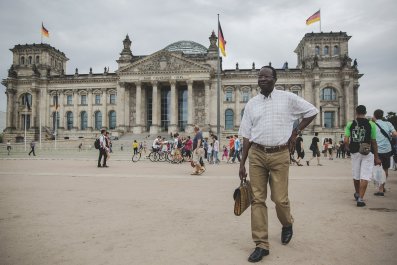When angry Brazilians poured into the streets three months ago, president Dilma Rousseff looked to be in big trouble. Her approval ratings plummeted from 69 percent this time last year to 30 percent last month. She was booed in public—at a football stadium, no less—and retreated behind palace doors while her spin men fired off disclaimers. Many pundits wrote off her reelection in 2014 while cardinals of the ruling Workers' Party openly called for a return of her predecessor and political mentor, the popular Luiz Inácio Lula da Silva, to whose party she belongs.
But if God is Brazilian, as natives like to say, lately it looks as though he's got Dilma's back. In recent weeks, the star-crossed leader's ratings have rebounded. Public anger has dissipated. Even the sluggish economy is showing flickering signs of recovery. The poised and defiant figure in oversize pearls and a halogen-blue blazer, who waxed indignant at the opening session of the United Nations General Assembly in New York recently, looked anything but a politician on the run. Lashing out at the U.S. government, Rousseff called Washington's habit of spying on allies an "inadmissible" breach of national sovereignty and "a serious violation of human rights and civil liberties." Applause resounded in the assembly hall.
With a 38 percent job approval score, Rousseff has hardly achieved rock-star status. But the bounce has helped quell speculations that her political career is over. One of her blessings has been protest fatigue. The nationwide demonstrations of June and July splintered into factions of smaller groups flogging local grievances and rock-slinging extremists who drove law-abiding middle-class protesters from the streets. Then Brasilia reversed course, finally scrapping its populist gospel of loose money and price controls that goosed growth but failed to sustain it. After a bout of belt tightening and fiscal sobriety, prices are down and the economy shows tentative signs of growing again. As does Rousseff's stature.
Yet her return to popular grace also owes something to an unexpected diplomatic windfall. In an interview with Newsweek, political analyst Fernando Schüler termed it "Edward Snowden's gift," referring to the former U.S. security analyst turned whistleblower. In June, Snowden leaked information showing that Washington routinely helped itself to classified data from its giant South American neighbor. Washington brushed it off as routine intelligence gathering, not espionage. Yet the purloined Brazilian data included not only records on Rousseff's phone calls and emails, but also data snatched from the computer networks of major Brazilian companies, such as the mining conglomerate Vale and state-owned oil major, Petrobras, raising concerns about industrial spying.
Rousseff was livid and demanded explanations. Fence-mending efforts by the White House, including a phone call from Vice President Joe Biden and another from Obama himself, didn't help. On September 17, she canceled a long-planned trip to Washington, the only state visit on Obama's calendar this year. "Like so many other Latin Americans, I fought against arbitrary power and censorship," Rousseff told the U.N. Assembly. "Without privacy, there is no liberty of opinion. Without respect for sovereignty, there is no basis for relations between nations."
Of course, no one should expect a new Cold War in the Americas: the two largest economies in the hemisphere have too much at stake to seriously row, including bilateral trade of $100 billion a year. Still, as Rousseff's broadside suggests, entente may have to wait. With elections approaching and national pride running high, the smart money is on the Brazilian leader working the home crowd any way she can, including taking pokes at busybodies in Washington. "It's a perfect case of using the enemy without to whip up internal support," former foreign minister Luiz Felipe Lampreia tells Newsweek. "It's worked for thousands of years."
























